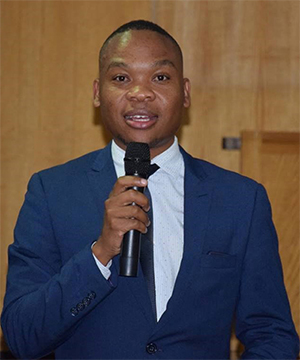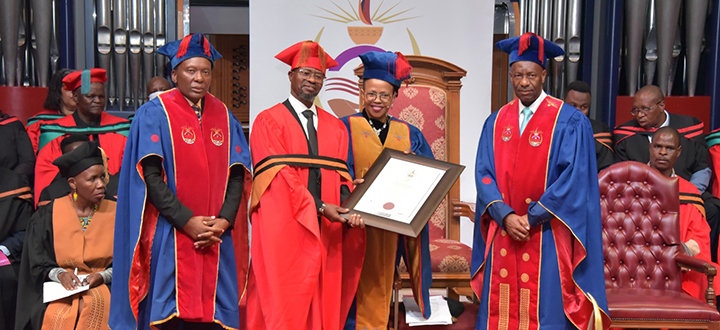Research
Information, research, and communities interrelated
 Macdonald Rammala, an emerging researcher from Unisa’s Institute for Dispute Resolution in Africa (IDRA), in the College of Law, attended the Fourth International Conference on New Directions in Multidisciplinary Research and Practice, held from 12 to 13 May 2018 at the Hilton Hotel, London. He attended in his capacity as the project leader for Lekgotla La Batho (People’s Council) which is an ongoing community-engaged participatory research project of IDRA in Makapanstad Village, North West Province.
Macdonald Rammala, an emerging researcher from Unisa’s Institute for Dispute Resolution in Africa (IDRA), in the College of Law, attended the Fourth International Conference on New Directions in Multidisciplinary Research and Practice, held from 12 to 13 May 2018 at the Hilton Hotel, London. He attended in his capacity as the project leader for Lekgotla La Batho (People’s Council) which is an ongoing community-engaged participatory research project of IDRA in Makapanstad Village, North West Province.
The focus of this international conference was on empirical studies and insight that contribute to the scientific body of knowledge, practical standards, identification of research challenges, and the broader information systems. In attendance were scholars, professors, researchers, and students from Malaysia, Germany, USA, Kuwait, Iran, India, Canada, Turkey, Taiwan, Mexico, Saudi Arabia, Croatia, England, Jordan, Mongolia, Egypt, Algeria, Philippines, China, and Spain.
The conference followed a multi-inter-transdisciplinary approach, which is aligned with the research activities of IDRA, especially in its research and engagement with communities as sites of knowledge.
In opening, Professor Rozhan Mohammed from the University of Sains Islam Malaysia emphasised the need to recognise changing patterns and trends in academia and communities. He went on to state that technology was a strong force in research and that scholars should be updated so that they could be better positioned to cope with the evolving technological advancements.
Mohammed asserted that information technology had also taken over some of the major aspects of our daily lives and that research was important in understanding information systems. Regardless of the technological shifts, traditional communities have specific individuals who are entrusted with the responsibility and the duty to share and exchange information with the researchers. Information, research, and communities are interrelated concepts that contribute to the scientific body of knowledge, practical solutions, and building trust in academic research relationships.
Professor Carsten Rennhak from the University of the German Federal Armed Forces focused on the research that is based on the military. Multidisciplinary research and practice requires a greater sense of support, cooperation and understanding of the different fields of disciplines. More so, the research that goes into the aspects of the military also carries a great significance and meaning in academia and in community sites of knowledge. People’s experiences play a major role in research and when these experiences are shared and documented, this provides new directions in knowledge, information and practices.
The two keynote speakers, Mohammed and Rennhak, both emphasised the relevance, significance, originality, validity, and clarity that is required in multidisciplinary research.
Rammala shared his research on Multidisciplinary research into the indigenous knowledge systems of South Africa, the role of lekgotla (people’s council) in communities. In this research, the role of lekgotla in dispute resolution was shared with the delegates.
From a multidisciplinary research perspective, the first paper in this conference focused on historical ideals of artistic and social development that was contributed by women from the Bauhaus (1919-1933).
On the technological aspects, Rennhak analysed the credibility of the e-word of mouth using customer reviews in social media.
The research on indigenous hunting communities of Asia (Taiwan) looked at the tribal hunting ground mapping. In this tribal hunting ground mapping, the Taiwanese researcher looked into the traditional mechanisms that the hunters utilise and how they map out their hunting grounds.
From Malaysia, research into the financial literacy for the elderly people was shared with the conference participants. This financial literacy research was a case study from Malaysia in which the elderly are involved.
From India, the researcher focused on Demystifying the ethical appeals and gender polarity embedded in the act of persuasion characterizing television commercials targeted at Indian kids. In this research, the link between children and the media were closely analysed.
Teresita S Festin from the Philippines shared her studies into the comparative survey of intuitive intelligence teaching styles versus emotional intelligence teaching styles among Philippine Normal University-Institute of Teaching and Learning Student Practice Teachers.
Research into teaching was also an important topic in the conference and one of the papers focused on teachers’ and students’ perceptions of the academic and socio-economic benefits of peer tutoring.
The role of YouTube in advanced level English interpretation lessons was also shared with the participants. In this research, YouTube is utilised as a learning tool to improve the language skills of Mongolian students.
Scholars from the United States of America also shared research into politics and the focus was on defamation and criticism.
Family law scholars from Croatia focused on divorce without financial expenses and the legal regulation and economic dilemmas. Research into health and cultural differences in developing countries was shared with the participants. The papers that were delivered ranged from business, management, social sciences, humanity studies, law, medicine, health engineering, and technological sciences.
This conference served as a platform to help the community of scholars across nations to explore the critical role of sustainability and growth of human societies. It also provided an opportunity for researchers to discuss avenues for interdisciplinary research innovations and to identify effective ways to address the regional and global challenges faced by our societies.
*By Macdonald Rammala
Publish date: 2018-06-12 00:00:00.0

 Young Unisa doctoral graduate joins elite Lindau Nobel Laureate group
Young Unisa doctoral graduate joins elite Lindau Nobel Laureate group
 Education MEC addresses Unisa autism seminar
Education MEC addresses Unisa autism seminar
 Seven Unisans nominated for the NSTF-South32 Awards 2023/2024
Seven Unisans nominated for the NSTF-South32 Awards 2023/2024
 Unisa awards posthumous honorary doctorate to literary maven, OK Matsepe
Unisa awards posthumous honorary doctorate to literary maven, OK Matsepe
 From humble beginnings to academic leadership
From humble beginnings to academic leadership